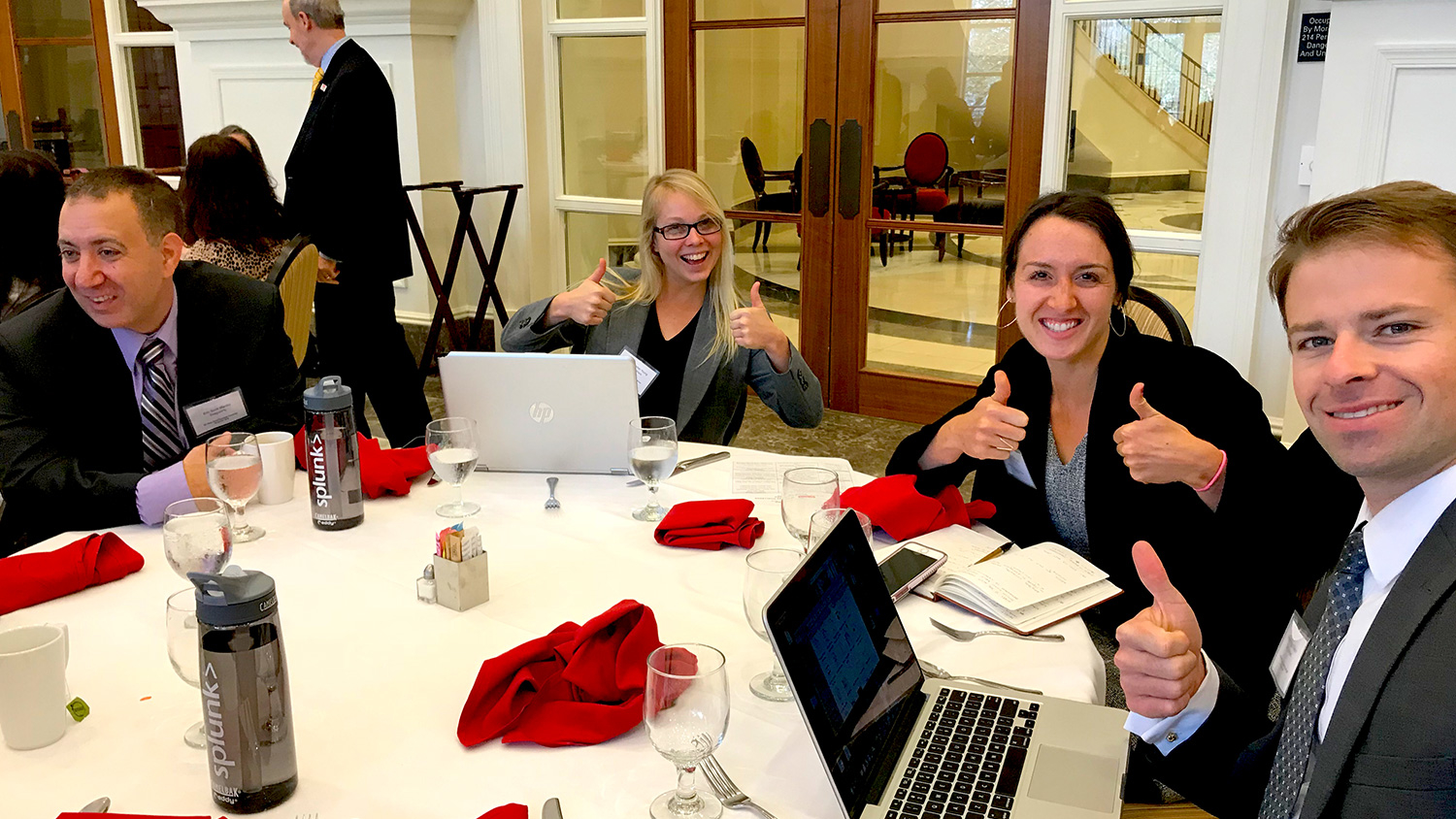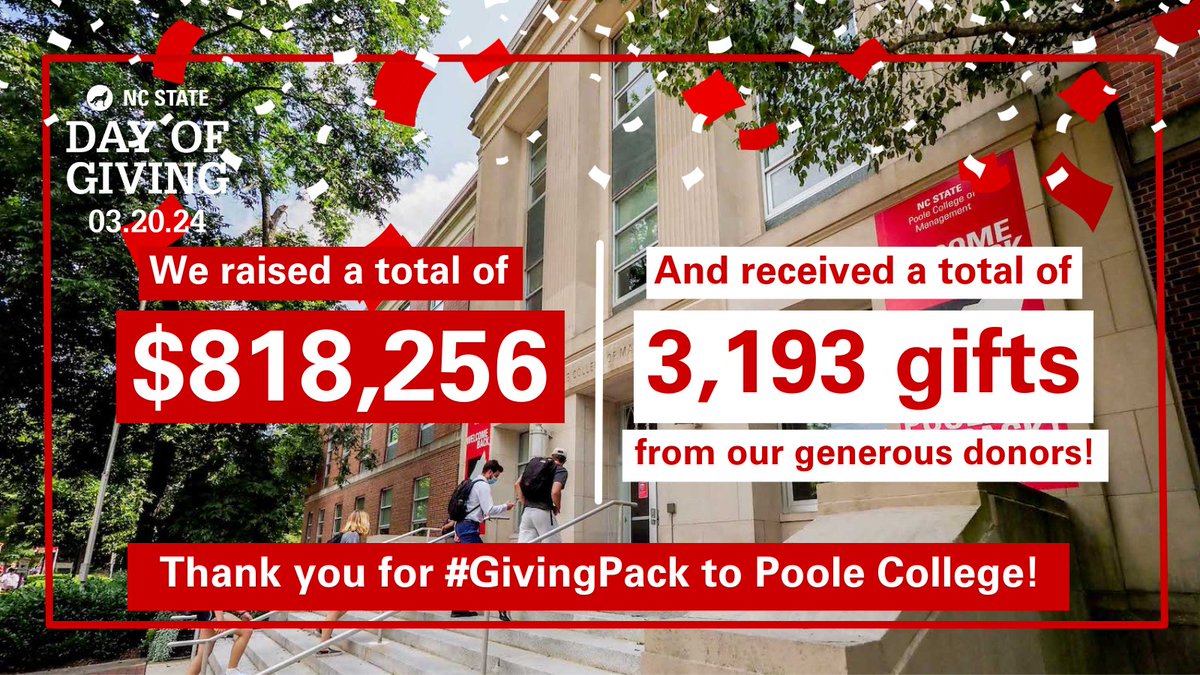MBA Teams Bring Creative Energy to NC State Grand Business Challenge

“These are the type of people that business, industry and the government would hire. This is the cream of the crop,” said Michael Bender, a research scholar at the Laboratory for Analytic Sciences at North Carolina State University.
Bender was one of 16 judges for the third annual NC State Grand Business Challenge, hosted by the NC State Jenkins MBA program in the Poole College of Management in Raleigh, N.C., and sponsored by Merck.
The three-day competition, held November 1-3, 2018, at the NC State Alumni Center and Hunt Library on the university’s Centennial Campus, provides MBA students an opportunity to challenge their strategic, creative problem solving skills and also provides select recruiters a chance to meet potential new employees.
Twelve teams of MBA students from business schools across the United States, as well as Prague and Singapore, arrived at NC State on Thursday, November 1, ready to put their knowledge to work as they vied for cash prizes ranging from $2,000 for the fourth place team to $16,000 for the first place challenge winners. Prizes were also awarded in a poster competition.
The Merck Challenge
The challenge and its format varies from year to year, but centers on a cybersecurity issue, said Andrew Porter, director of enterprise architecture at Merck. “The first year, we were testing the waters, to learn what schools have (in place) about cyber security,” he said. “In year two, we looked at future technology and how that adds complexity to cybersecurity. This year, we focused on the fact that these students will be the future leaders, and how that will spin out, from an IT perspective.”
Merck’s goal with the competition, he said, “is to increase awareness of cybersecurity, to get our business leaders of tomorrow to start thinking about cybersecurity in a different way. Many think of it as an IT problem, but it’s really a business problem, and accountability goes all the way up to the board of directors,” he said.
“The teams’ challenge for the next 48 hours was to develop an actionable strategic response to a hypothetical – but in today’s world not improbable – cyber security attack that disrupted company operations,” Porter said as the competition was getting under way. “Their recovery plan had to address the diverse issues that might follow such an attack, ranging from employee safety to technology infrastructure and regulatory compliance,” he said.
Speaking of the team responses, Porter said, “Sometimes you get a solution that could be a diamond in the rough. Year over year, we’ve had significantly better positioned teams.”
In addition to Merck, this event is sponsored by Securonix, Splunk, Cisco and Exostar, who participated in a recruiting event held in conjunction with the competition.
2018 NC State Grand Business Challenge winning teams.
First place: The Johns Hopkins University Carey Business School, Washington, D.C. Team members Priya Arunachalam, Abhinav Chintakunta, Benjamin Schneider, and Paul Simpkins competed as The Lau Foundation team.
Second place: Texas Christian University, Fort Worth, Texas. Team members Kyle Carter, Rachel Manthei, Amanda Pape and Jason Stacking competed as the Side Effect team.
: Terry College of Business, University of Georgia, Athens, Georgia. Team members Scott Giveans, Ratna Balaji Govindarajan, Megan Grandin and Tyler Miyawaki competed as the ProSQuad team.
Fourth place: College of Business, Rider University, Princeton, New Jersey. Team members Ryan Dickerson, Eric Marino and Matt Van Horn competed as the Dragonfly team.
About the winning team
This is the second time a Carey Business School team has competed in the challenge. Three of the 2017 team members returned for this year’s competition, joined by Paul Simpkins. The team name – The Lau Foundation – is a reference to a team member who had stepped down the previous year to comply with the competition’s four-person limit on team size, Arunachalam said. His last name was Lau, and while he could not participate this time, his colleagues named the team in his honor.
None of the team members have cyber security backgrounds, Arunachalam said, but “all were grounded in research and business principles. It was great to create a strategy that could be implemented.”
Poster Competition
Teams also had an opportunity to participate in a poster competition, in which they were asked to expand on one of the points raised in the Grand Business Challenge: What additional steps could institutions take to create more effective partnerships to reduce costs? And beyond partnerships, what alternative methods might cut costs associated with, or reduce the occurrences of, cyber-attacks?
Three teams placed in the poster competition:
- First Place, $1,000: University of Economics, Prague. Team members Marketa Smolnikova, Jana Malaskova, Jan Holub and Jakub Hanousek competed as the Notitia team
- Second Place, $750: Rutgers Business School, Newark, N.J. Team members Anand Bhatia, Fironica Lao, Harry Raval and Rohan Shah competed as the Guardian Health team
- Third Place, $300: Clemson University College of Business, Clemson, S.C. Team members Jamilah Abdi, Jillian Davis Gaskins, Nadeen Qubti and Carissa Robinson competed as the Domin8 team.
Also competing in the 2018 Challenge were teams from:
- Boston University Questrom School of Business
- Duke University Fuqua School of Business
- Florida State University College of Business
- North Carolina State University Poole College of Business
- Singapore Management University
Photo Gallery
[data-ps-embed-type=slideshow] > iframe {position: absolute;top: 0;left: 0;}
This post was originally published in Jenkins MBA News.






